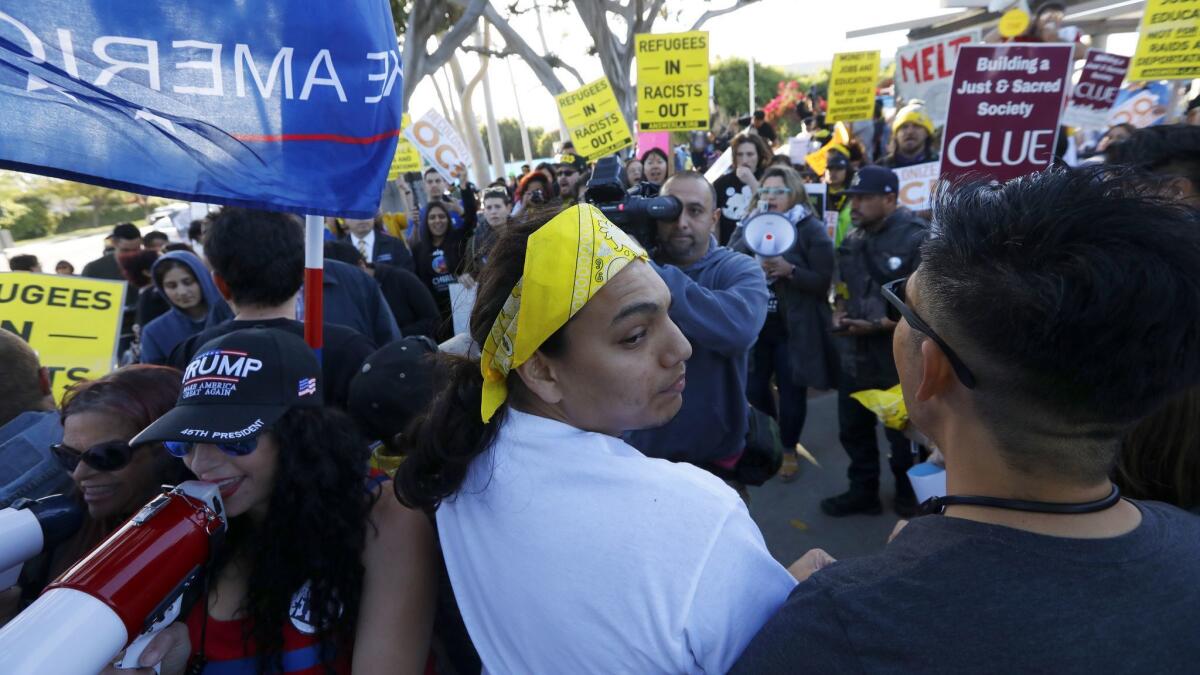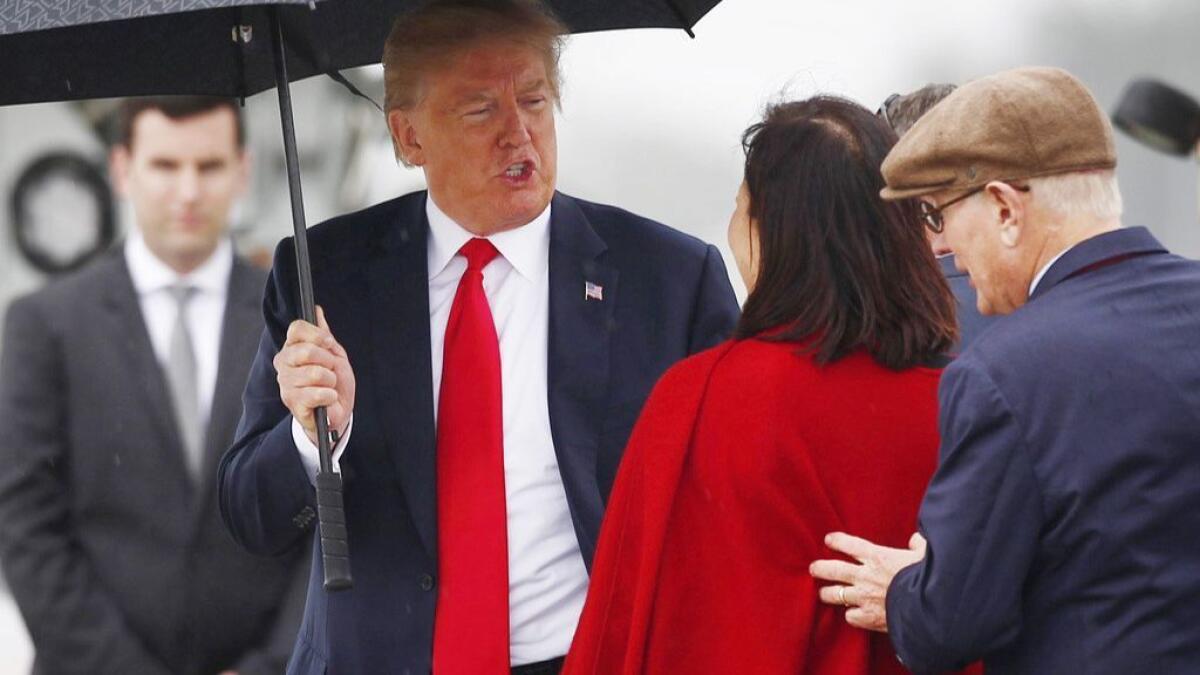Sanctuary state fight at local level may be more orchestrated than organic

- Share via
With California and the Trump administration locked in a legal battle over immigration policies, a state Republican leader and an illegal immigration critic are quietly offering to help communities fight the state’s new “sanctuary” law.
County officials are scheduled to get advice on how to challenge the law at a private meeting scheduled next week in Fresno, according to a copy of an invitation from the Fresno County Republican Party chairman that was obtained by the Los Angeles Times.
The Fresno meeting follows growing opposition in Southern California to the state’s pro-immigrant, anti-Trump administration stance. It appears to reveal a behind-the-scenes effort by Republicans to mobilize some of the state’s most conservative communities in a counterstrike against the resistance movement.
Listed speakers include Shawn Steel, a member of the Republican National Committee and the former chairman of the state GOP, and Susan Tully, the national field director of the Federation for American Immigration Reform (FAIR). Steel and Tully are expected to “offer advice and legal assistance to all jurisdictions,” according to the invitation.
The sanctuary law, passed along party lines last year, was the centerpiece in a package of bills signed by Gov. Jerry Brown that offer protections to some 2.3 million people living in the state illegally, limiting collaboration between local law enforcement and federal immigration agencies.
Republicans, who will be in San Diego this weekend for their annual state party convention, see the battle over the law as a key component of their turnout strategy as the party works to defend GOP members of Congress. Their defeat could allow Democrats to gain control of the House in November.
A state GOP official said that party leaders didn’t know about the Fresno effort. After initially declining to comment, Fresno County party Chairman Fred Vanderhoof said Tuesday he was solely responsible for the meeting. But he declined to say who was invited other than elected officials in the Central Valley.
“I thought I would get some leaders together to inform them what elected officials have been doing in other jurisdictions in Southern California,” he said.
The invitation for the meeting Monday suggests three options for local governments to counter the law, naming the places where the strategies have been used: passing a local ordinance to refuse compliance (Los Alamitos), filing a brief in support of current or future litigation (Orange County) or introducing their own lawsuit (Huntington Beach).
“These are places that have good ideas,” said Steel, who confirmed he planned to speak and added that there could be many more ways to oppose a California law he called “criminal” and “unconstitutional.”
The local movement against the law began in March in the Orange County suburb of Los Alamitos, where more than 100 people attended a raucous meeting as council members voted to try to exempt the city from the sanctuary law. Weeks later, the all-Republican Orange County Board of Supervisors voted in favor of a resolution to join U.S. Atty. Gen. Jeff Sessions’ lawsuit against California over the new immigration laws.

One of those who voted to join the suit was Steel’s wife, Orange County Supervisor Michelle Steel. The couple were among a small group that greeted President Trump on the tarmac on his first visit to California as president in March. Trump has since tweeted praise for Orange County and its pushback against sanctuary policies.
Other cities in Orange County — including Yorba Linda, Buena Park, Huntington Beach and Mission Viejo — have also started to take action against the state laws aimed at protecting immigrants from increased immigration enforcement and deportations.
The invitation to next week’s Fresno meeting, along with emails obtained by civil rights groups through public records requests, raised questions about whether the local actions are more orchestrated than organic.
Tully is the head of a national organization classified as an anti-immigrant hate group by the nonprofit Southern Poverty Law Center, a label FAIR has vehemently rejected. She has been speaking against the sanctuary law since at least last June, when she addressed a group of Republican women in San Diego that was planning to take action against the legislation before it was enacted.
A spokesman for FAIR’s legal team, the Immigration Reform Law Institute, has disputed that either it or FAIR approached California cities, saying local officials were instead seeking out the group.
But in mid-March, according to public records obtained by the American Civil Liberties Union of Southern California, Tully emailed each member of the Yorba Linda City Council and the mayor to ask the city to file a brief in support of Sessions’ lawsuit against California. She said that her group was searching for cities and counties to join the case and that its legal team would represent the city for free.
On Tuesday, a city spokeswoman confirmed that FAIR made the offer to help file the brief.
Even so, Ira Mehlman, a FAIR spokesman, said he didn’t know who initiated contact in Yorba Linda but argued that opposition to the law emerged from local governments.
“We have been working with locally based groups [in California] for a long time,” Mehlman said. “We are more than happy to help if they ask for advice.”
The sanctuary law, named the California Values Act, prevents law enforcement officers from holding and questioning people for federal immigration agents in many cases and limits them from sharing the release dates of some county jail inmates who are in the country illegally. It is one of three state immigration laws that Sessions has challenged in federal court, charging that Brown and lawmakers are attempting to keep federal immigration officials from doing their jobs. Speaking to law enforcement officers in Sacramento in March, Sessions said Democratic elected officials in California were advancing the political agendas of “radical extremists.”
But a recent statewide poll found strong support — 56% of voters surveyed— for the sanctuary law, with high approval numbers among Latinos, African Americans, young voters and women. More than 50% also largely opposed efforts by local officials to opt out of the law.
State Sen. Kevin de León (D-Los Angeles), the former Senate leader who wrote the sanctuary law, said the planned event in Fresno is “proof positive” that the White House, the Republican National Committee and the California Republican Party are “working in concert with extremist organizations like FAIR in a desperate attempt to secure votes in November.”
He said he and fellow legislators were prepared to defend the law from legal challenges from the Trump administration. But they did not anticipate local elected officials going along with the kind of strategy that De León likened to the anti-illegal-immigrant campaign surrounding Proposition 187 in 1994.
The ballot initiative, which had political roots in Orange County, would have denied public services to people in the country illegally. It was approved by voters but was eventually struck down in court.
Pro-immigrant and civil rights groups have attempted to counter opposition to the sanctuary law and what activists said was an increasing number of hate incidents, ethnic slurs and anti-Semitic comments at various council meetings. Days after Los Alamitos passed its ordinance to opt out of the law, the ACLU of Southern California and other civil rights groups filed a lawsuit against the city challenging the ordinance’s legality. Mayor Troy Edgar is trying to raise funds to fight the suit.
On Tuesday, Jon Rodney, communications director with the California Immigrant Policy Center, said the meeting in Fresno showed “that what has been happening is a manufactured tantrum in the service of a hate-filled agenda that is totally unrepresentative of California as a whole.”
Fresno could be fertile ground for expanding the ranks of sanctuary law opponents. Former Sheriff Joe Arpaio of Arizona, accused of racial profiling of Latinos, made an appearance last year at a GOP fundraiser there. And Fresno County Sheriff Margaret Mims has been an outspoken critic of the sanctuary law, saying her deputies and Immigration and Custom Enforcement officials have had a close relationship.
Fresno County Supervisor Buddy Mendes said Tuesday that the county had no intention of taking action against the state law. He said he was one of three Republican Fresno supervisors invited to the meeting next week, but he said he declined to attend. Three county supervisors discussing such an issue in a private session, he said, would be a violation of a state law that guarantees the public the right to participate in local legislative meetings.
It’s not clear which other local officials were invited to attend the meeting.
Both the law and local opposition to it, Mendes said, are “Seinfeld deals” — political shows about nothing because federal law will overrule state law, and state law will overrule local law.
“What are you going to prove, one way or another?” Mendes said.
Coverage of California politics »
More to Read
Get the L.A. Times Politics newsletter
Deeply reported insights into legislation, politics and policy from Sacramento, Washington and beyond. In your inbox three times per week.
You may occasionally receive promotional content from the Los Angeles Times.











